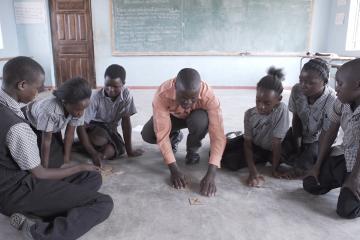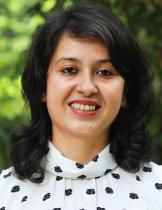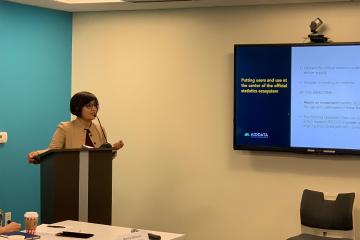
Alumni Voices: A perennial student

The Alumni Voices series is a platform for J-PAL alumni to share their work in their own words.
As the former director of Policy, Training and Communications at J-PAL South Asia, Shagun Sabarwal '21 was instrumental to pushing forward J-PAL's mission of evidence-based policymaking in India and expanding our portfolio of scale-ups and state partnerships. Now leading WomenLift Health’s efforts in India, she reflects on her lessons learned at J-PAL in our latest Alumni Voices blog.
In October 2015, I found myself sitting on a rickety chair, in the middle of a crowded government office in Punjab, India, waiting for “madam” to grant me and my colleagues what would become my first meeting with a government partner for J-PAL South Asia. I was beset with multiple conflicting emotions—nervousness, impatience, and wonder at where I was. The fifteen minutes that followed, during which we discussed the challenges facing health workers in the state and presented new research ideas to the Health Secretary of the Government of Punjab, changed the course of my career.
Thus began my love affair of working with governments to truly improve lives. To this day, even after moving on from working in the evidence-to-policy world, one belief has stuck with me: Only by partnering with governments in ways that make sense to them can we play a role in furthering development work.
In my six years at J-PAL South Asia, I designed and implemented several new strategies for propelling our mission of evidence-based policymaking in India and substantially grew our portfolio of scale-ups and state partnerships. In parallel, I also worked closely with J-PAL affiliated professors and the research team to develop and implement research projects in the region.
In October 2021, I joined WomenLift Health as its India Program and Global Monitoring, Evaluation, and Learning (MEL) Director to focus my energies towards gender equality more directly and advancing women’s leadership in health.
In terms of scope and objectives, the two roles couldn’t have been more different—my work at J-PAL South Asia inhabited the evidence-to-policy space, while WomenLift Health’s work focuses on designing, implementing, and tracking programs in the areas of gender, health, and diversity, equity, and inclusion. I still find myself relying heavily on my lived experiences working with diverse development stakeholders from my time in J-PAL South Asia. Below, I share some key lessons and insights that I have learnt and that I continue to draw on in my new role.
1. Working with government partners
Development stakeholders come in many shapes and forms. Government partners, however, are unique in one way: since they hold the decision-making power, an asymmetry exists when organizations outside the government system are trying to make the case for a solution or approach. The exposure, guidance, and real-time learning I accumulated by working with governments at J-PAL have been unique and valuable.
2. Recognizing what matters to partners and converging incentives
Time and again, by working closely with government officials, funders, or researchers, I learnt that only by accounting for diverse incentives and making concerted efforts to align them can partners work together in meaningful ways and realize the lasting success of partnerships.
Listening generously, approaching each conversation with a genuine desire to understand existing constraints, barriers, and incentives of potential partners, and learning from them are key approaches that I have internalized and that I continually apply in my new role. This worldview is undoubtedly the most important insight I have carried with me and I believe it is key for building fruitful coalitions that can respond in meaningful ways to solve the problem of a lack of diversity in health leadership.
3. Bringing evidence to bear while proposing an idea or position
During my doctoral training, I was conditioned to use evidence and data for substantiating any argument or proposal. In subsequent full-time professional roles, however, I quickly realized that this was not how most organizations approached their work. At J-PAL, I found a welcome exception. It was during my time with the organization that using this approach became second nature to me. Using logic models and frameworks that are driven by a clarity of what we are trying to achieve and how we achieve it has become my modus operandi, a skill that my work at J-PAL South Asia helped hone.
4. Absorbing lessons at every step of the development process
Perhaps the greatest lesson from my time at J-PAL is the consciousness that I want to be a student all my life and continue to learn at every step. On entering J-PAL, you enter a world where learning is of the highest value—learning from the stakeholders you work with, your team, J-PAL affiliated professors, senior management, and most of all, learning from the field.
Whether the “field” refers to where the participants of a research project are, a government office, or the office of an NGO partner, these “frontlines” are where development work truly happens, crucial exposure that J-PAL offers to those who are fortunate enough to work here.


